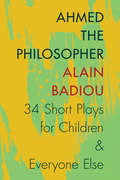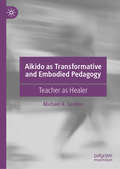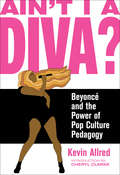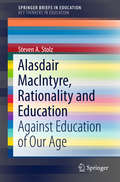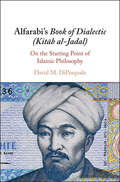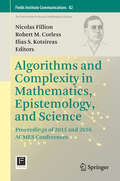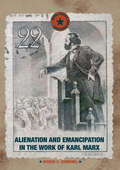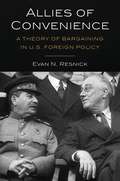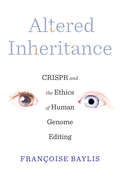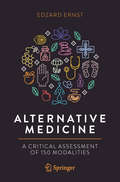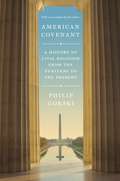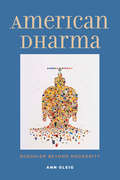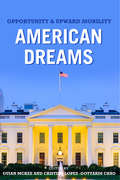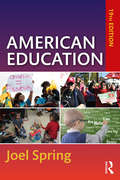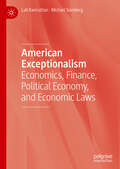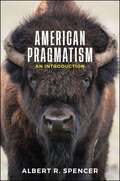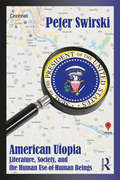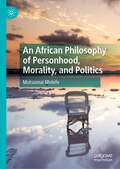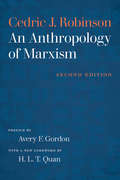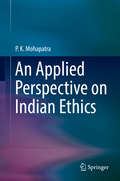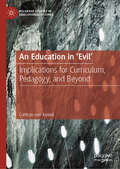- Table View
- List View
Agency, Freedom and Choice (Theory and Decision Library A: #53)
by Constanze BinderIn this book, Binder shows that at the heart of the most prominent arguments in favour of value-neutral approaches to overall freedom lies the value freedom has for human agency and development. Far from leading to the adoption of a value-neutral approach, however, ascribing importance to freedom’s agency value requires one to adopt a refined value-based approach. Binder employs an axiomatic framework in order to develop such an approach. She shows that a focus on freedom’s agency value has far reaching consequences for existing results in the freedom ranking literature: it requires one to move beyond a person’s given all-things-considered preferences to the values underlying a person’s preference formation. Furthermore, it requires, as Binder argues, one to account (only) for those differences between choice options which really matter to people. Binder illustrates the implications of her analysis for the evaluation of public policy and human development with the capability approach: only if sufficient importance is ascribed to freedom’s agency value can the capability approach keep its promises.
Ahmed the Philosopher: Thirty-Four Short Plays for Children and Everyone Else
by Alain BadiouEnglish-speaking readers might be surprised to learn that Alain Badiou writes fiction and plays along with his philosophical works and that they are just as important to understanding his larger intellectual project. In Ahmed the Philosopher, Badiou's most entertaining and accessible play, translated into English here for the first time, readers are introduced to Badiou's philosophy through a theatrical tour de force that has met with much success in France. <P><P> Ahmed the Philosopher presents its comic hero, the "treacherous servant" Ahmed, as a seductively trenchant philosopher even as it casts philosophy itself as a comic performance. The comedy unfolds as a series of lessons, with each "short play" or sketch illuminating a different Badiousian concept. Yet Ahmed does more than illustrate philosophical abstractions; he embodies and vivifies the theatrical and performative aspects of philosophy, mobilizing a comic energy that exposes the emptiness and pomp of the world. Through his example, the audience is moved to a living engagement with philosophy, discovering in it the power to break through the limits of everyday life.
Aikido as Transformative and Embodied Pedagogy: Teacher as Healer
by Michael A. GordonDrawing on the author’s lifelong practice in the non-competitive and defensive Japanese art of Aikido, this book examines education as self-cultivation, from a Japanese philosophy (e.g. Buddhist) perspective. Contemplative practices, such as secular mindfulness meditation, are being increasingly integrated into pedagogical settings to enhance social and emotional learning and well-being and to address stress-induced overwhelm due to increased pressures on the education system and its constituents. The chapters in this book explore the various ways, through the lens of this non-violent relational art of Aikido, that pedagogy is always something being practiced (on the level of psychological, somatic and emotional registers) and thus holding potential for transformation into being more relational, ecological-minded, and reflecting more ‘embodied attunement.’ Positioning education as a practice, one of self-discovery, the author argues that one can approach personal development as engaging in a spiritual process of integrating mind and body towards full presence of being and existence.
Ain't I a Diva?: Beyoncé and the Power of Pop Culture Pedagogy
by Kevin Allred&“[Allred] interrogates Beyoncé&’s music and videos to explore the complicated spaces where racism, sexism, and capitalism collide.&” —Kirkus Reviews In 2010, Professor Kevin Allred created the university course &“Politicizing Beyoncé&” to both wide acclaim and controversy. He outlines his pedagogical philosophy in Ain&’t I a Diva?, exploring what it means to build a syllabus around a celebrity. Topics range from a capitalist critique of &“Run the World (Girls)&” to the politics of self-care found in &“Flawless&”; Beyoncé&’s art is read alongside black feminist thinkers including Kimberlé Crenshaw, Octavia Butler, and Sojourner Truth. Combining analysis with classroom anecdotes, Allred attests that pop culture is so much more than a guilty pleasure, it&’s an access point—for education, entertainment, critical inquiry, and politics.&“Proving himself a worthy member of the BeyHive, Kevin Allred takes us on a journey through Beyoncé&’s greatest hits and expansive career—peeling back their multiple layers to explore gender, race, sexuality, and power in today&’s modern world. A fun, engaging, and important read for long-time Beyoncé fans and newcomers alike.&” —Franchesca Ramsey, author of Well, That Escalated Quickly&“Ain&’t I a Diva? explores the phenomenon of Beyoncé while explicitly championing not only her immense talent and grace but what we can learn from it. In this celebration of Beyoncé, and through her, other Black women, Allred is giving us room to be exactly who we are so that maybe we, too, can stop the world then carry on!&” —Keah Brown, author of The Pretty One&“A must-read for any fan of Beyoncé and of fascinating feminist discourse.&” —Zeba Blay, senior culture writer, HuffPost
Alasdair MacIntyre, Rationality and Education: Against Education of Our Age (SpringerBriefs in Education)
by Steven A. StolzDespite Alasdair MacIntyre being known as an academic who has made many notable contributions to a range of areas in philosophy, his thinking on education is not as well-known and/or properly understood by most audiences and readerships that predominantly reside in educational contexts. With this in mind, this book aims to provide a critique of MacIntyre’s thinking about education, and hence commences with a central theme found in MacIntyre’s extensive corpus concerning the fragmentation and disunification of ideas found in our culture and society that stems both from the rejection of metaphysics and what it means to be a human being living within the context of history. According to MacIntyre, part of the problem why this has occurred is due to educational institutions, particularly universities failing to resist the pressure exerted from industry and the state to conform. Unfortunately, this has resulted in a type of intellectual dissensus where the shared conceptions of rational enquiry and the role of reason have been replaced by pluralistic notions of private and personal choices concerning the good, and a disillusionment with reason that is ultimately exhibited as apathy and conformism. In order to overcome this apathy and conformism found in our culture and society, MacIntyre’s educational project is concerned with the cultivation of rationality; however, this is not an easy undertaking because it involves students being confronted with alternative – sometimes rather hostile – rival traditions so they both come to see rival points of view and understand that each tradition, including their own, does not come from a neutral or value-neutral standpoint. To MacIntyre, dialectical encounters between traditions is a crucial starting point of a good education, but for intellectual and academic progress to be made, rational enquiry needs to be grounded in a shared understanding of first principles that aims at truth and rational vindication. It is this shift in thinking that is of interest in the latter part of this book, particularly MacIntyre’s views around tradition-orientated communities of practice. Here, MacIntyre is concerned with the praxis of his educational project and the crucial role tradition-orientated communities play in the cultivation of independent reasoners who are capable of seeing the interconnectedness between different forms of knowledge that can lead us to an informed discovery of both the truth, and of the good, but most importantly exhibit virtuous dispositions which are vital to good practical reasoning.
Alfarabi's Book of Dialectic (Kitāb al-Jadal): On the Starting Point of Islamic Philosophy
by David M. DiPasqualeWidely regarded as the founder of the Islamic philosophical tradition, and as the single greatest philosophical authority after Aristotle by his successors in the medieval Islamic, Jewish, and Christian communities, Alfarabi was a leading figure in the fields of Aristotelian logic and Platonic political science. The first complete English translation of his commentary on Aristotle's Topics, Alfarabi's Book of Dialectic, or Kitāb al-Jadal, is presented here in a deeply researched edition based on the most complete Arabic manuscript sources. David M. DiPasquale argues that Alfarabi's understanding of the Socratic art of dialectic is the key prism through which to grasp his recovery of an authentic tradition of Greek science on the verge of extinction. He also suggests that the Book of Dialectic is unique to the extent to which it unites Alfarabi's logical and political writings, opening up novel ways of interpreting Alfarabi's influence.
Algorithms and Complexity in Mathematics, Epistemology, and Science: Proceedings of 2015 and 2016 ACMES Conferences (Fields Institute Communications #82)
by Ilias S. Kotsireas Robert M. Corless Nicolas FillionACMES (Algorithms and Complexity in Mathematics, Epistemology, and Science) is a multidisciplinary conference series that focuses on epistemological and mathematical issues relating to computation in modern science. This volume includes a selection of papers presented at the 2015 and 2016 conferences held at Western University that provide an interdisciplinary outlook on modern applied mathematics that draws from theory and practice, and situates it in proper context. These papers come from leading mathematicians, computational scientists, and philosophers of science, and cover a broad collection of mathematical and philosophical topics, including numerical analysis and its underlying philosophy, computer algebra, reliability and uncertainty quantification, computation and complexity theory, combinatorics, error analysis, perturbation theory, experimental mathematics, scientific epistemology, and foundations of mathematics. By bringing together contributions from researchers who approach the mathematical sciences from different perspectives, the volume will further readers' understanding of the multifaceted role of mathematics in modern science, informed by the state of the art in mathematics, scientific computing, and current modeling techniques.
Alienation and Emancipation in the Work of Karl Marx (Marx, Engels, and Marxisms)
by George C. ComninelThis book considers Karl Marx’s ideas in relation to the social and political context in which he lived and wrote. It emphasizes both the continuity of his commitment to the cause of full human emancipation, and the role of his critique of political economy in conceiving history to be the history of class struggles. The book follows his developing ideas from before he encountered political economy, through the politics of 1848 and the Bonapartist “farce,”, the maturation of the critique of political economy in the Grundrisse and Capital, and his engagement with the politics of the First International and the legacy of the Paris Commune. Notwithstanding errors in historical judgment largely reflecting the influence of dominant liberal historiography, Marx laid the foundations for a new social theory premised upon the historical consequences of alienation and the potential for human freedom.
Allies of Convenience: A Theory of Bargaining in U.S. Foreign Policy
by Evan N. ResnickSince its founding, the United States has allied with unsavory dictatorships to thwart even more urgent security threats. How well has the United States managed such alliances, and what have been their consequences for its national security? In this book, Evan N. Resnick examines the negotiating tables between the United States and its allies of convenience since World War II and sets forth a novel theory of alliance bargaining.Resnick’s neoclassical realist theory explains why U.S. leaders negotiate less effectively with unfriendly autocratic states than with friendly liberal ones. Since policy makers struggle to mobilize domestic support for controversial alliances, they seek to cast those allies in the most benign possible light. Yet this strategy has the perverse result of weakening leverage in intra-alliance disputes. Resnick tests his theory on America’s Cold War era alliances with China, Pakistan, and Iraq. In all three cases, otherwise hardline presidents bargained anemically on such pivotal issues as China’s sales of ballistic missiles, Pakistan’s development of nuclear weapons, and Iraq’s sponsorship of international terrorism. In contrast, U.S. leaders are more inclined to bargain aggressively with democratic allies who do not provoke domestic opposition, as occurred with the United Kingdom during the Korean War. An innovative work on a crucial and timely international relations topic, Allies of Convenience explains why the United States has mismanaged these “deals with the devil”—with deadly consequences.
Altered Inheritance: CRISPR and the Ethics of Human Genome Editing
by Françoise BaylisWith the advent of CRISPR gene-editing technology, designer babies have become a reality. Françoise Baylis insists that scientists alone cannot decide the terms of this new era in human evolution. Members of the public, with diverse interests and perspectives, must have a role in determining our future as a species.
Alternative Medicine: A Critical Assessment of 150 Modalities
by Edzard ErnstAlternative medicine (AM) is hugely popular; about 40% of the US general population have used at least one type of alternative treatment in the past year, and in Germany this figure is around 70%. The money spent on AM is considerable: the global market is expected to reach nearly US $ 200 billion by 2025, with most of these funds coming directly out of consumers’ pockets. The reasons for this popularity are complex, but misinformation is certainly a prominent factor. The media seem to have an insatiable appetite for the subject and often report uncritically on it. Misinformation about AM on the Internet (currently about 50 million websites are focused on AM) is much more the rule than the exception. Consumers are thus being bombarded with misinformation on AM, and they are ill-protected from such misinformation and therefore prone to making wrong, unwise or dangerous therapeutic decisions, endangering their health and wasting their money. This book is a reference text aimed at guiding consumers through the maze of AM. The concept of the book is straightforward. It has two main parts. The first, short section provides essential background on AM, explaining in simple terms what is (and what is not) good, reliable evidence, and addressing other relevant issues like, for instance, the placebo response, informed consent, integrative medicine, etc. The second and main part consists of 150 short chapters, topically grouped and each dedicated to one single alternative therapeutic or diagnostic method. In each of them, seven critical points are raised. These points relate to issues that are important for consumers’ decisions whether it is worth trying the method in question. Restricting the discussion to just seven points means that issues must be prioritized to those themes which are most relevant in the context of each given modality.
Amartya Sen (Key Contemporary Thinkers)
by Lawrence HamiltonAmartya Sen is one of the world’s best-known voices for the poor, the destitute and the downtrodden and an inspiration for policy makers and activists across the globe. He has also contributed almost without peer to the study of economics, philosophy and politics, transforming social choice theory, development economics, ethics, political philosophy and Indian political economy, to list but a few. <P><P> This book offers a much-needed introduction to Amartya Sen’s extraordinary variety of ideas. Lawrence Hamilton provides an excellent, accessible guide to the full range of Sen’s writings, contextualizing his ideas and summarizing the associated debates. In elegant prose, Hamilton reconstructs Sen’s critiques of the major philosophies of his time, assesses his now famous concern for capabilities as an alternative for thinking about poverty, inequality, gender discrimination, development, democracy and justice, and unearths some overlooked gems. Throughout, these major theoretical and philosophical achievements are subjected to rigorous scrutiny.
American Covenant: A History of Civil Religion from the Puritans to the Present
by Philip GorskiThe long battle between exclusionary and inclusive versions of the American storyWas America founded as a Christian nation or a secular democracy? Neither, argues Philip Gorski in American Covenant. What the founders envisioned was a prophetic republic that would weave together the ethical vision of the Hebrew prophets and the Western political heritage of civic republicanism. In this eye-opening book, Gorski shows why this civil religious tradition is now in peril—and with it the American experiment.American Covenant traces the history of prophetic republicanism from the Puritan era to today, providing insightful portraits of figures ranging from John Winthrop and W.E.B. Du Bois to Jerry Falwell, Ronald Reagan, and Barack Obama. Featuring a new preface by the author, this incisive book demonstrates how half a century of culture war has drowned out the quieter voices of the vital center, and demonstrates that if we are to rebuild that center, we must recover the civil religious tradition on which the republic was founded.
American Dharma: Buddhism Beyond Modernity
by Ann GleigThe past couple of decades have witnessed Buddhist communities both continuing the modernization of Buddhism and questioning some of its limitations. In this fascinating portrait of a rapidly changing religious landscape, Ann Gleig illuminates the aspirations and struggles of younger North American Buddhists during a period she identifies as a distinct stage in the assimilation of Buddhism to the West. She observes both the emergence of new innovative forms of deinstitutionalized Buddhism that blur the boundaries between the religious and secular, and a revalorization of traditional elements of Buddhism such as ethics and community that were discarded in the modernization process. Based on extensive ethnographic and textual research, the book ranges from mindfulness debates in the Vipassana network to the sex scandals in American Zen, while exploring issues around racial diversity and social justice, the impact of new technologies, and generational differences between baby boomer, Gen X, and millennial teachers.
American Dreams: Opportunity and Upward Mobility (Miller Center Studies on the Presidency)
by Peter Wehner Michael Nelson William A. Galston Margaret O'Mara Richard Schragger Melody Barnes Cristina Lopez-Gottardi Chao Guian McKee Robert C. PiantaIn an increasingly polarized political environment, the first year of the new president’s term will be especially challenging. With a fresh mandate, however, the first year also offers opportunities that may never come again. The First Year Project is a fascinating initiative by the Miller Center of the University of Virginia that brings together top scholars on the American presidency and experienced officials to explore the first twelve months of past administrations, and draw practical lessons from that history, as we inaugurate a new president in January 2017.This project is the basis for a new series of digital shorts published as Miller Center Studies on the Presidency. Presented as specially priced collections published exclusively in an ebook format, these timely examinations recognize the experiences of past presidents as an invaluable resource that can edify and instruct the incoming president.Contributors: Melody Barnes, New York University * William A. Galston, Brookings Institution * Dambisa Moyo, global economist and author * Michael Nelson, Rhodes College * Margaret O’Mara, University of Washington * Robert Pianta, University of Virginia * Richard Schragger, University of Virginia * Peter Wehner, Ethics and Public Policy Center
American Education (Sociocultural, Political, and Historical Studies in Education)
by Joel SpringFeaturing current information and challenging perspectives on the latest issues and forces shaping the American educational system—with scholarship that is often cited as a primary source—Joel Spring introduces readers to the historical, political, social, and legal foundations of education and to the profession of teaching in the United States. In his signature straightforward, concise approach to describing complex issues, he illuminates events and topics that are often overlooked or whitewashed, giving students the opportunity to engage in critical thinking about education. Students come away informed on the latest topics, issues, and data and with a strong knowledge of the forces shaping the American educational system. Thoroughly updated throughout, the new edition of this clear, authoritative text remains fresh and up-to-date, reflecting the many changes in education that have occurred since the publication of the previous edition. Topics and issues addressed and analyzed include: • The decline of the Common Core State Standards, particularly as result of a Republican-controlled administration currently in place• Increasing emphasis on for-profit education, vouchers, charter schools, and free-market competition between schools, expected to surge with the appointment of the new U.S. Secretary of Education Betsy DeVos • Current debates about immigration and "Dreamers"—new statistics on immigrant education, discussion of education proposals to accommodate the languages, cultures, and religions of newly arrived immigrants• New education statistics on school enrollments, dropouts, education and income, school segregation, charter schools, and home languages• The purposes of education as presented in the 2016 platforms of the Republican, Democratic, Green, and Libertarian parties• Discussions around transgender students
American Exceptionalism: Economics, Finance, Political Economy, and Economic Laws
by Michael Szenberg Lall RamrattanThe publication of Alexis de Tocqueville’s Democracy in America has kindled interest across disciplines to appraise the exceptional nature of U.S. activities. In general, however, all the published works have not focused their analyses from an economic point of view. While economics was for some a “dismal science” following Thomas Carlyle’s characterization of Malthus’ demographic model, it has increasingly become the “queen of the social sciences” for more practitioners. The book fills a gap in the literature by describing the American contributors as precursors and genuinely exceptional economists. We present their works within the state of the nation in which they advance their discipline.One is treated to both qualitative and quantitative theories in the opening chapter. Budding theories that became established theories of Economics and Finance are investigated in Chapters II and III. When President John Adams was confronted with M. Turgot’s criticisms of the American government, he resorted to a historic survey of types of government from ancient Greece to the Middle Ages. Similarly, we have included a final chapter, Chapter IV, to present the argument for American Exceptionalism in the domain of Political Economy and Economic Law over the ages.
American Pragmatism: An Introduction
by Albert R. SpencerIn this comprehensive introduction, Albert Spencer presents a new story of the origins and development of American pragmatism, from its emergence through the interaction of European and Indigenous American cultures to its contemporary status as a diverse, vibrant, and contested global philosophy. Spencer explores the intellectual legacies of American pragmatism’s founders, Peirce and James, but also those of newly canonical figures such as Addams, Anzaldúa, Cordova, DuBois, and others crucial to its development. He presents the diversity of pragmatisms, old and new, by weaving together familiar and unfamiliar authors through shared themes, such as fallibilism, meliorism, pluralism, verification, and hope. Throughout, Spencer reveals American pragmatism's engagement with the consequences of US political hegemony, as versions of pragmatism arise in response to both the tragic legacies and the complicated benefits of colonialism. American Pragmatism is an indispensable guide for undergraduate students taking courses in pragmatism or American philosophy, for scholars wishing to develop their understanding of this thriving philosophical tradition, or for curious readers interested in the genealogy of American thought.
American Sutra: A Story of Faith and Freedom in the Second World War
by Duncan Ryūken WilliamsDuncan Ryūken Williams reveals the little-known story of how, in the darkest hours of World War II when Japanese Americans were stripped of their homes and imprisoned in camps, a community of Buddhists launched one of the most inspiring defenses of religious freedom in our nation’s history, insisting that they could be both Buddhist and American.
American Utopia: Literature, Society, and the Human Use of Human Beings
by Peter SwirskiFrom Black Tuesday to the White House, from Plato to Robert Nozick, from Eugene Debs to Richard Nixon, from Peter Cornelis Plockhoy to the hippie communes of the Sixties, from universal basic income to utopian basic income, from proverbial wisdom to multilevel selection, from Big Data to paleomorality, from Prisoner’s Dilemma to social-engineering Israeli kindergartens, from time travel to gene engineering, from the pretzel logic of meritocracy to deaggressing humanity, American Utopia maps the pitfalls and windfalls of social reform in the name of the human use of human beings. Interrogating the assumptions behind four outré utopias by Thomas M. Disch, Bernard Malamud, Kurt Vonnegut, and Margaret Atwood, the book interrogates the assumptions that have historically been central to the utopian project. Whence the seeds of social discontent? Whence our taste for egoism and altruism? For waging war and waging peace? Can we bioengineer human nature to specifications? Should we? Who makes better guardians: humans or machines? And who will guard the guardians?
An African Philosophy of Personhood, Morality, and Politics
by Motsamai MolefeThis book explores the salient ethical idea of personhood in African philosophy. It is a philosophical exposition that pursues the ethical and political consequences of the normative idea of personhood as a robust or even foundational ethical category. Personhood refers to the moral achievements of the moral agent usually captured in terms of a virtuous character, which have consequences for both morality and politics. The aim is not to argue for the plausibility of the ethical and political consequences of the idea of personhood. Rather, the book showcases some of the moral-political content and consequences of the account it presents.
An Anthropology of Marxism (Race And Representation Ser.)
by Cedric J. RobinsonAn Anthropology of Marxism offers Cedric Robinson's analysis of the history of communalism that has been claimed by Marx and Marxists. Suggesting that the socialist ideal was embedded both in Western and non-Western civilizations and cultures long before the opening of the modern era and did not begin with or depend on the existence of capitalism, Robinson interrogates the social, cultural, institutional, and historical materials that were the seedbeds for communal modes of living and reimagining society. Ultimately, it pushes back against Marx's vision of a better society as rooted in a Eurocentric society, and cut off from its own precursors. Accompanied by a new foreword by H.L.T. Quan and a preface by Avery Gordon, this invaluable text reimagines the communal ideal from a broader perspective that transcends modernity, industrialization, and capitalism.
An Applied Perspective on Indian Ethics
by P. K. MohapatraThis book presents a novel interpretation of major problems of Indian ethics from an applied ethical perspective. It approaches prominent theories like Dharma, Karma and Purusarthas from a critical point of view, so as to render them logically consistent and free from some standard limitations. Ethical theories are meant to provide guidance for life, but quite often many of our celebrated theories appear to be inapplicable or difficult to apply in practical life. Indian ethical theories are of special significance to this problem because they have in them rich potentials of applicability as much as many of them typify inapplicable abstract theories of morals. The book incorporates a wealth of research on ethical theories, keeping in view the spirit of ethics and the demands of the situations; for a reasoned balance between the two is the key to applied ethics. The book argues that ethical theories are objective but defeasible in overriding circumstances where competing values deserve preference. Such justified exceptions are warranted by the very spirit of ethics, which is to promote the good life. The argument from defeasibility and justified violation in the book helps bridging the gap between ethics and its application and makes Indian theories of value appear in fresh light- workable, practically applicable and effective as incentives for morality. With uncommon virtue of contemporized presentation of Indian ethics, this book should be of interest to scholars and researchers working on Indian ethics and moral philosophy, as well as to those interested in Indian culture and value tradition.
An Ecotopian Lexicon
by Kim Stanley Robinson Karen O'Brien David N. Pellow Kari Marie Norgaard Randall Amster Daniel Worden Rebecca Evans Sheena Wilson Anthony Lioi Andrew Pendakis Sam Solnick Brent Ryan Bellamy Melody Jue Andrew Alan Johnson Yifei Li Carolyn Fornoff Evelyn O'Malley Sofia Ahlberg Malcolm Sen Chris Pak Allison Ford Jennifer Lee Johnson Michael Horka Ann Kristin Schorre John Esposito Kira Bre Clingen Miraim Tola Charis Boke Pierre-Héli Monot Andrew Hageman Janet Tamalik McGrath Kimberly Skye Richards Robert Savino Oventile Cherice BockPresents thirty novel terms that do not yet exist in English to envision ways of responding to the environmental challenges of our generation As the scale and gravity of climate change becomes undeniable, a cultural revolution must ultimately match progress in the realms of policy, infrastructure, and technology. Proceeding from the notion that dominant Western cultures lack the terms and concepts to describe or respond to our environmental crisis, An Ecotopian Lexicon is a collaborative volume of short, engaging essays that offer ecologically productive terms—drawn from other languages, science fiction, and subcultures of resistance—to envision and inspire responses and alternatives to fossil-fueled neoliberal capitalism. Each of the thirty suggested &“loanwords&” helps us imagine how to adapt and even flourish in the face of the socioecological adversity that characterizes the present moment and the future that awaits. From &“Apocalypso&” to &“Qi,&” &“ ~*~ &“ to &“Total Liberation,&” thirty authors from a range of disciplines and backgrounds assemble a grounded yet dizzying lexicon, expanding the limited European and North American conceptual lexicon that many activists, educators, scholars, students, and citizens have inherited. Fourteen artists from eleven countries respond to these chapters with original artwork that illustrates the contours of the possible better worlds and worldviews.Contributors: Sofia Ahlberg, Uppsala U; Randall Amster, Georgetown U; Cherice Bock, Antioch U; Charis Boke, Cornell U; Natasha Bowdoin, Rice U; Kira Bre Clingen, Harvard U; Caledonia Curry (SWOON); Lori Damiano, Pacific Northwest College of Art; Nicolás De Jesús; Jonathan Dyck; John Esposito, Chukyo U; Rebecca Evans, Winston-Salem State U; Allison Ford, U of Oregon; Carolyn Fornoff, U of Illinois at Urbana-Champaign; Michelle Kuen Suet Fung; Andrew Hageman, Luther College; Michael Horka, George Washington U; Yellena James; Andrew Alan Johnson, Princeton U; Jennifer Lee Johnson, Purdue U; Melody Jue, U of California, Santa Barbara; Jenny Kendler; Daehyun Kim (Moonassi); Yifei Li, NYU Shanghai; Nikki Lindt; Anthony Lioi, Juilliard School of New York; Maryanto; Janet Tamalik McGrath; Pierre-Héli Monot, Ludwig Maximilian U of Munich; Kari Marie Norgaard, U of Oregon; Karen O&’Brien, U of Oslo, Norway; Evelyn O&’Malley, U of Exeter; Robert Savino Oventile, Pasadena City College; Chris Pak; David N. Pellow, U of California, Santa Barbara; Andrew Pendakis, Brock U; Kimberly Skye Richards, U of California, Berkeley; Ann Kristin Schorre, U of Oslo, Norway; Malcolm Sen, U of Massachusetts Amherst; Kate Shaw; Sam Solnick, U of Liverpool; Rirkrit Tiravanija, Columbia U; Miriam Tola, Northeastern U; Sheena Wilson, U of Alberta; Daniel Worden, Rochester Institute of Technology.
An Education in 'Evil': Implications for Curriculum, Pedagogy, and Beyond (Palgrave Studies in Educational Futures)
by Cathryn van KesselThis book asserts that engaging with divergent understandings about the nature of evil and how it functions can help those interested in education think through issues in curriculum, pedagogy, and beyond. The author provokes thinking about and through the concept of evil in the spirit of thoughtful education (as opposed to thoughtless schooling) toward how we might live together in less harmful ways. Although thinking about evil can be uncomfortable and troubling, such inquiries help us explore what sort of relations we want to have with others. Analyzing our role in evil as humans, as well as our responsibilities to counter the processes of evil present in our everyday lives, opens up a potential to foster radical thought in and out of the classroom.

